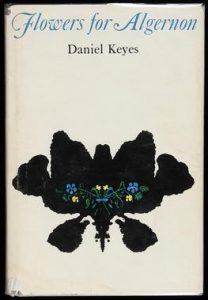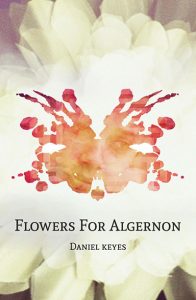 Flowers for Algernon, written by Daniel Keyes, is the third short story we read in Tales We Read, the Fall 2020 semester recreational reading program at Rutgers – New Brunswick. We have chosen this story because it touches on perennial scientific topics such as human subject research, animal research, and science ethics, while also addressing attitudes towards the mentally disabled. Flowers for Algernon is one of the perfect classic short stories if we wish to discuss these topics from a historical perspective and assess how far society has come since the mid-20th-century.
Flowers for Algernon, written by Daniel Keyes, is the third short story we read in Tales We Read, the Fall 2020 semester recreational reading program at Rutgers – New Brunswick. We have chosen this story because it touches on perennial scientific topics such as human subject research, animal research, and science ethics, while also addressing attitudes towards the mentally disabled. Flowers for Algernon is one of the perfect classic short stories if we wish to discuss these topics from a historical perspective and assess how far society has come since the mid-20th-century.
Published in 1959, the short story preceded the famous novel Flowers for Algernon and movie Charly about Algernon, a laboratory mouse who had undergone experimental brain surgery to increase his intelligence. Narrated by Charlie Gordon, a special needs adult in his progress reports, the entries document the mental and emotional growth and decline of the first human to go through the same intervention expressed in the language, style, and grammar used. With a cognitive development at warp speed after the successful surgery, Charlie is on fast track to turn into a genius for a few months only to realize the temporary nature of the change, first in the entire research group. Observing Algernon, as the mouse going through various phases of development post-surgery, he soon becomes aware that the positive effects are bound to wear off in no time. He decides to focus all his efforts and declining brain power to prevent the inevitable, seemingly all in vain. But he admits, “I will have lived a thousand normal lives by what I may add to others.” Charlie Gordon is a character easy to love and respect, regardless of the ups and downs in the story mirroring the fluctuation of his IQ, illustrated by the last entry in his journal “P.S. please if you get a chanse put some flowrs on Algernons grave in the bak yard,”
The short story was initially published in the April 1959 issue of The Magazine of Fantasy & Science Fiction, followed by the expanded novel in 1966, a bestseller of over 5 million copies. The novel has been adapted several times for other media, most prominently as the 1968 film Charly, starring Cliff Robertson (who won an Academy Award for Best Actor) and Claire Bloom. Keyes also won the Hugo Award in 1959 and the Nebula Award in 1966 for the story. See more facts on Wikipedia.
However, Flowers for Algernon had not started as a success story, for all the editor’s intent to make it to one with a Hollywood ending. Commissioned to write it for the Galaxy Science Fiction magazine, Keyes was asked to write a different ending, in which Charlie retained his intelligence, married Alice Kinnian, and lived happily ever after. The author refused to make the change and sold the story to The Magazine of Fantasy & Science Fiction instead.
“Charlie has stopped watching us.” The most prominent topic in the short story roots in the protagonist himself: Charlie Gordon is a mentally disabled man recording his thoughts in “progress reports.” The reader in 2020 will be mightily shocked reading the details how persons with cognitive and intellectual disabilities were treated, strong language included, at work or at school, such as the “Beekman College Center for Retarded Adults.” It proves the fact that, since the short story was published, the government, various organizations, and individuals in the United States have done a lot in this area, but also urges us to consider further barriers to overcome, either in the US or elsewhere.
Research conducted illegally or without the knowledge or informed consent of the test subjects is not only appalling, but is also considered unethical in our times. However, until the very recent past, human experimentation was not unheard of. The various components of the experiment can be placed on a sliding scale of science ethics, the most horrifying parts measure up to Nazi human experimentation or unethical practices with an ethnic minority, such as the test subjects of the infamous Tuskegee experiment.
In addition to the topics in science ethics, the story can inspire a discussion on the limitations of science and the attitudes of scientists towards science. The various characters choose their own approach to scientific experiments from hubris to compassion. Charlie himself undergoes a change from the desire to be smart “so I can have lots of friends who like me” to the perspective of the “new breed of intellectual supermen,” but watching Algernon’s decline has a great impact on him, highlighting the importance of being conscious and empathic while working on an unemotional scientific experiment.
 The book Flowers for Algernon is on the American Library Association’s list of the 100 Most Frequently Challenged Books of 1990–1999 at number 43 due to various reasons. Elaborating on certain aspects of Charlie’s struggle to understand himself in his new situation, including his sexual desires and violent family history (not included in the short story version), the book provides plenty of excuses to be removed from the shelves of school libraries and as such, is considered a banned book. Reading Flowers for Algernon teaches critical thinking, following Charlie Gordon’s sentiments:
The book Flowers for Algernon is on the American Library Association’s list of the 100 Most Frequently Challenged Books of 1990–1999 at number 43 due to various reasons. Elaborating on certain aspects of Charlie’s struggle to understand himself in his new situation, including his sexual desires and violent family history (not included in the short story version), the book provides plenty of excuses to be removed from the shelves of school libraries and as such, is considered a banned book. Reading Flowers for Algernon teaches critical thinking, following Charlie Gordon’s sentiments: